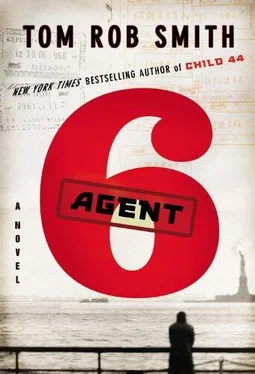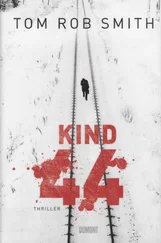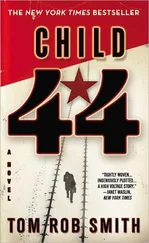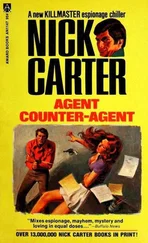Tom Smith - Agent 6
Здесь есть возможность читать онлайн «Tom Smith - Agent 6» весь текст электронной книги совершенно бесплатно (целиком полную версию без сокращений). В некоторых случаях можно слушать аудио, скачать через торрент в формате fb2 и присутствует краткое содержание. Жанр: Триллер, на английском языке. Описание произведения, (предисловие) а так же отзывы посетителей доступны на портале библиотеки ЛибКат.
- Название:Agent 6
- Автор:
- Жанр:
- Год:неизвестен
- ISBN:нет данных
- Рейтинг книги:4 / 5. Голосов: 1
-
Избранное:Добавить в избранное
- Отзывы:
-
Ваша оценка:
- 80
- 1
- 2
- 3
- 4
- 5
Agent 6: краткое содержание, описание и аннотация
Предлагаем к чтению аннотацию, описание, краткое содержание или предисловие (зависит от того, что написал сам автор книги «Agent 6»). Если вы не нашли необходимую информацию о книге — напишите в комментариях, мы постараемся отыскать её.
Agent 6 — читать онлайн бесплатно полную книгу (весь текст) целиком
Ниже представлен текст книги, разбитый по страницам. Система сохранения места последней прочитанной страницы, позволяет с удобством читать онлайн бесплатно книгу «Agent 6», без необходимости каждый раз заново искать на чём Вы остановились. Поставьте закладку, и сможете в любой момент перейти на страницу, на которой закончили чтение.
Интервал:
Закладка:
The only choice had been for the Soviet Union to involve itself directly. They invaded at Christmas, 1979, three months ago. With the new influx of soldiers Leo was no longer a solitary Soviet in the city. Russian tanks controlled the streets of Kabul. The former president was assassinated and a new president, Babrak Kamal, was installed, suppliant to Soviet commands. A radio broadcast denounced the excesses of the previous leader and promised to uphold fairness and the rule of law. The new regime was presented as just rather than thuggish, wide-reaching rather than savage and punitive. Yet any goodwill created by the removal of a despised leader was offset by the hatred inspired by the presence of foreign troops, troops the President legitimized by requesting their assistance, as if they had yet to arrive, using the Treaty of Friendship and Good Neighbourliness as the legal framework. It was a political charade, transparently cynical to even the casual observer. In February anti-Soviet demonstrations in Kabul turned into a riot. Three hundred people were killed. Even these deaths were not enough to quell the violence: Kabul’s shops were closed for a week. A fly-over of jets and helicopters was ordered, a show of force, an implicit threat that troublesome districts would be destroyed, levelled to the ground if they did not submit.
The need for a powerful and effective secret police force grew more pressing. The force was renamed, now known as KhAD, the State Information Agency – the Afghan equivalent of the KGB. False promises were made. The era of senseless savagery was at an end. No more rivers of blood. No more red pigeons. President Kamal designated 13 January 1980 as a day of national mourning for all those killed by the previous president, and the very next day Leo began his classes, engaged as a teacher for the newly recruited Afghan agents.
With his coarse grey beard and skin aged and cracked by the hot Afghan summers, his Soviet colleagues joked that Special Adviser Leo Demidov had gone native. They’d concede that he didn’t wear a shalwar kameez, traditional local attire, but he didn’t wear a uniform either – he was not one of them. His clothes were a blend of styles, locally knitted shirts, Soviet army-issue trousers, American Ray-Ban sunglasses and plastic flip-flops mass-produced in China. He was one of the few Soviet advisers who spoke fluent Dari, a dialect of Persian, the language of the governing classes in Afghanistan less commonly spoken than Pashto. Dari was the first foreign language Leo had learned and he now spoke it more often than Russian. In his idle hours he read about the culture and history of this land and discovered that the only thing to rival the power of opium as a form of escape was academic study. Excluding Communist dogma, for thirty years Leo had hardly read a book; now he did little else.
The authorities tolerated Leo’s unorthodox behaviour and eccentricities with a leniency unheard of in the Soviet Union. Rules and regulations that applied back home were quietly ignored here. The concept of discipline was re-defined. Kabul was a frontier town, a revolution perched on a cliff face that every day was in danger of crumbling into anarchy. Many advisers begged to return home, resigning their posts, citing health problems, even cultivating dysentery. They argued that they could never be naturalized in the way that Leo had been. Yet though he was the longest serving Soviet adviser in Kabul, Leo did not consider himself any more Afghani than the day he’d arrived. The claim that he’d gone native was made by scared Soviet soldiers who’d just stepped off the transport plane, many of whom had never been abroad before. None of the Afghans Leo came into contact with thought of him as one of them. He was acquainted with many: he as a friend to none. He was foreign and being foreign was not scored on a graded scale. He was recognized as different from other Soviets. Seemingly without beliefs of any kind, whether nationalistic or spiritual, he did not sing praises for his homeland. While he seemed restless and unsettled, he did not appear to miss the place where he was born. He spoke of no wife. He did not talk about his daughters, nor did he show anyone their photographs. He said nothing about himself. He was not of this land, nor did he belong to the land he’d left behind. In many ways it was easier to understand the more conventional Soviet forces, in uniforms, with ideology and purpose, objectives, strategies and timelines. They represented something, even if it was something to be despised and a force to be defeated. Leo represented nothing. Nihilism was a notion even more alien than Communism itself.
*
Leo squeezed his brakes. Up ahead a truck had caught a tyre in a pothole and spilled thousands of plastic bottles of treated drinking water. There was shouting between those involved. The traffic had backed up. Impatient drivers honked their horns. Leo glanced at the rooftops, at the casual spectators – he’d seen enough road accidents in Kabul to tell when something was staged and the set-up for an ambush. There were no Soviet vehicles in the traffic, and unable to see any reason for the obstacle than the perilous state of the roads, he weaved his way through the scattered bottles, ignored by the angry participants, before continuing past the truck. Glancing over his shoulder he saw children filling their ragged shirts with bottles before scuttling away with their loot. He’d passed through the accident as if he didn’t exist.
Picking up speed, he recited a poem by Sabbah, written many centuries ago: Alone in a desert
I have lost my way:
The path is long and I am
Without help or companion,
Not knowing which way to go.
Unlike the voice in the poem, the destination for Leo had always been clear. The torment was that he could not get there. He knew what he wanted to achieve but could not achieve it. With the road empty, mumbling the words of the poem, Leo closed his eyes, taking his hands off the handlebars and stretching them out to the side, snaking his bicycle from side to side.
Greater Province of Kabul City of Kabul Kabul Police Headquarters Dih Afghanan
Trainee agent Nara Mir was content to read her books while waiting for her teacher Comrade Leo Demidov to arrive. He was several hours late, a not unusual occurrence. Unreliable and erratic, he was perhaps the most peculiar man she’d ever met, certainly the most foreign, quite alien to her sensibilities. Despite this, she looked forward to his classes even if it was hard to imagine that he’d once been a member of the world-renowned KGB. At twenty-three, her training was nearly complete and soon she would become an agent supervising ideological education at schools and monitoring the students, assessing them, deciding which were likely to be assets to the regime and should be marked for government jobs and which were likely to prove problematic, perhaps even a threat. She did not consider such work spying: every teacher evaluated their students asd I t of their job, whether they worked for the State intelligence service or not. Excited by the prospect, she was at the forefront of the social changes, presented with an opportunity that hadn’t existed for women just a few years ago.
Nara’s recruitment was recent, part of the reformation of the Afghan secret police instigated less than three months ago. The previous organization, KAM, had been notorious, a cabal of butchers and sadists who pursued no greater purpose and served no ideology. She would never have worked for them. The dark days of their rule were over. A new president promised an era of restraint and probity. The Soviets were intent on developing her country into a great nation, as great as the USSR itself. Nara wanted to play her part in that development. The neighbouring Uzbek Soviet Socialist republic could boast of a population that was one hundred per cent literate. In Afghanistan only ten per cent of men could read and only two per cent of women. Life expectancy was forty years, compared to seventy in Uzbekistan. Almost half of all children died before reaching the age of five. No one could claim the status quo was worth preserving. In order to achieve these breakthroughs radical changes were needed. Opposition was inevitable. For progress to stand any chance people like her were needed to protect the regime. Vigilance was required against those who sought to cling on to the past. There were regions of Afghanistan that were locked in a way of life that hadn’t changed for thousands of years and consequently there had been and would continue to be dissent against any reforms. That was inevitable. Unfortunately, there would be loss of life. That was regrettable. In the city of Herat last year there had been an uprising against the compulsory education of women. Soviet advisers working in the city had been dragged into the streets and beheaded, their mutilated bodies paraded in a grotesque display. The only solution was a bombing campaign and the deaths of many civilians before the uprising was tamed. Violence was a necessary tool. She was sure these outbursts of bloody resistance were orchestrated by a few key influential traditionalist elements, men who would gladly see her stoned for taking a job, wearing a uniform. By isolating those dissidents many thousands of lives would ultimately be saved and the lives of many millions would be vastly improved.
Читать дальшеИнтервал:
Закладка:
Похожие книги на «Agent 6»
Представляем Вашему вниманию похожие книги на «Agent 6» списком для выбора. Мы отобрали схожую по названию и смыслу литературу в надежде предоставить читателям больше вариантов отыскать новые, интересные, ещё непрочитанные произведения.
Обсуждение, отзывы о книге «Agent 6» и просто собственные мнения читателей. Оставьте ваши комментарии, напишите, что Вы думаете о произведении, его смысле или главных героях. Укажите что конкретно понравилось, а что нет, и почему Вы так считаете.












